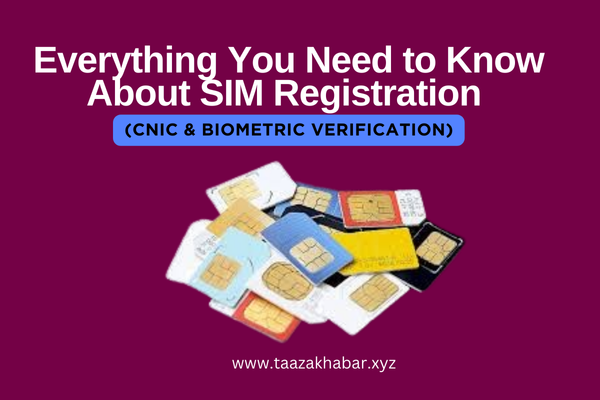Introduction to SIM Registration Requirements
In an increasingly digital world, the importance of securing your mobile communications has never been greater. One crucial step in ensuring the safety and legitimacy of SIM cards is registration. But what exactly does SIM registration entail, and why is it necessary? This article will guide you through everything you need to know about SIM registration requirements, specifically focusing on CNIC (Computerized National Identity Card) and biometric verification.
What is SIM Registration?
SIM registration refers to the process where individuals provide their personal information to telecom service providers before activating a SIM card. This registration ensures that each mobile number is linked to a verified individual, allowing authorities to track communications if necessary.
Globally, SIM registration is a common practice aimed at improving security and reducing mobile-related crimes. Most countries have now made it mandatory for telecom users to register their SIM cards before usage.
Why SIM Registration is Necessary
Security Concerns
SIM registration primarily addresses the issue of security. With the rise of terrorism, fraud, and other criminal activities, unregistered SIM cards can easily become tools for illegal activities. SIM registration helps authorities track and prevent such activities.
Prevention of Fraudulent Activities
By requiring personal identification for SIM card ownership, it reduces the chances of fraudulent activities. It’s harder for individuals to use a SIM card anonymously, which makes fraud prevention more effective.
Government Regulations
Governments across the globe, including Pakistan, have implemented strict regulations mandating the registration of SIM cards. These laws ensure that all users are traceable if necessary, contributing to national security efforts.
Understanding the CNIC (Computerized National Identity Card)
What is a CNIC?
The CNIC, or Computerized National Identity Card, is a crucial identification document issued to Pakistani citizens by the National Database and Registration Authority (NADRA). It plays a significant role in SIM registration as telecom companies rely on CNICs to verify the identity of applicants.
Eligibility for Obtaining a CNIC
To obtain a CNIC, individuals must be at least 18 years old and have proof of Pakistani citizenship. Foreign nationals residing in Pakistan typically require different forms of identification.
Biometric Verification for SIM Registration
The Introduction of Biometric Verification
With increasing concerns over identity theft and unregistered SIM cards, biometric verification has been introduced as an added layer of security. This involves verifying the individual’s identity through fingerprint scans, ensuring that the person registering the SIM is genuinely who they claim to be.
Why Biometric Verification is Crucial
Biometric verification helps eliminate identity fraud and ensures authenticity. It’s one of the most secure methods to confirm a person’s identity, as fingerprints are unique and hard to replicate.
Steps Involved in SIM Registration
Registering a SIM card involves several key steps:
- Visit the Authorized Retailer: Go to an official telecom provider or a registered franchise.
- Provide CNIC Information: Present your original CNIC for verification.
- Biometric Verification: Your fingerprints will be scanned and matched with the NADRA database.
- Confirmation: Once the verification is complete, the SIM will be registered in your name.
How to Check SIM Registration Status
You can check whether your SIM card is registered through the following methods:
- Online: Most telecom providers offer an online portal where you can verify your SIM registration status.
- SMS Service: You can send an SMS with your CNIC number to a designated number provided by your telecom company to check the status.
SIM Registration and Privacy Concerns
How Data is Stored
Biometric and personal data collected during SIM registration are stored by telecom companies and the government. While this ensures a higher level of security, it also raises privacy concerns for many users.
Regulations on Data Protection
Governments have put policies in place to safeguard users’ data. Telecom companies are required to follow strict guidelines regarding the storage, use, and protection of personal information, including biometric data.
Consequences of Not Registering a SIM
Failure to register a SIM card could lead to the following consequences:
- Legal Issues: In many countries, using an unregistered SIM is illegal.
- Service Disruption: Telecom companies have the right to deactivate unregistered SIM cards, cutting off communication services.
SIM Registration for Foreigners and Expats
Foreign nationals and expats living in Pakistan can register SIM cards, though the process is slightly different. Non-residents typically need to present a valid passport or other forms of identification, along with biometric verification.
The Future of SIM Registration
With advancements in technology, SIM registration may evolve into digital systems. The introduction of eSIMs and digital identities could make physical registration a thing of the past.
Common Issues in SIM Registration
Despite the streamlined process, users may encounter problems, such as mismatches in CNIC information or biometric verification errors.
How to Resolve SIM Registration Issues
In case of any issues, you can contact the customer service department of your telecom provider. They can assist in resolving any errors, be it biometric or CNIC-related.
Conclusion
SIM registration is a critical process for ensuring security, reducing fraud, and complying with legal requirements. Whether you’re a resident or a foreign national, following the necessary steps to register your SIM card helps keep mobile communications safe and traceable.
FAQs
Can I register multiple SIM cards with one CNIC?
Yes, you can register multiple SIM cards using one CNIC, though there may be a limit imposed by the government on the number of SIMs per person.
How do I register a SIM for my minor child?
You can register a SIM in your name for your child, as minors are not eligible to obtain CNICs.
What happens if I lose my CNIC?
You can still register a SIM, but you’ll need to get a duplicate CNIC issued by NADRA.
Can biometric verification be done remotely?
No, biometric verification must be done in person at an authorized outlet or retailer.
How can I deactivate an unneeded SIM card?
Contact your telecom provider to deactivate any SIM cards you no longer need.

